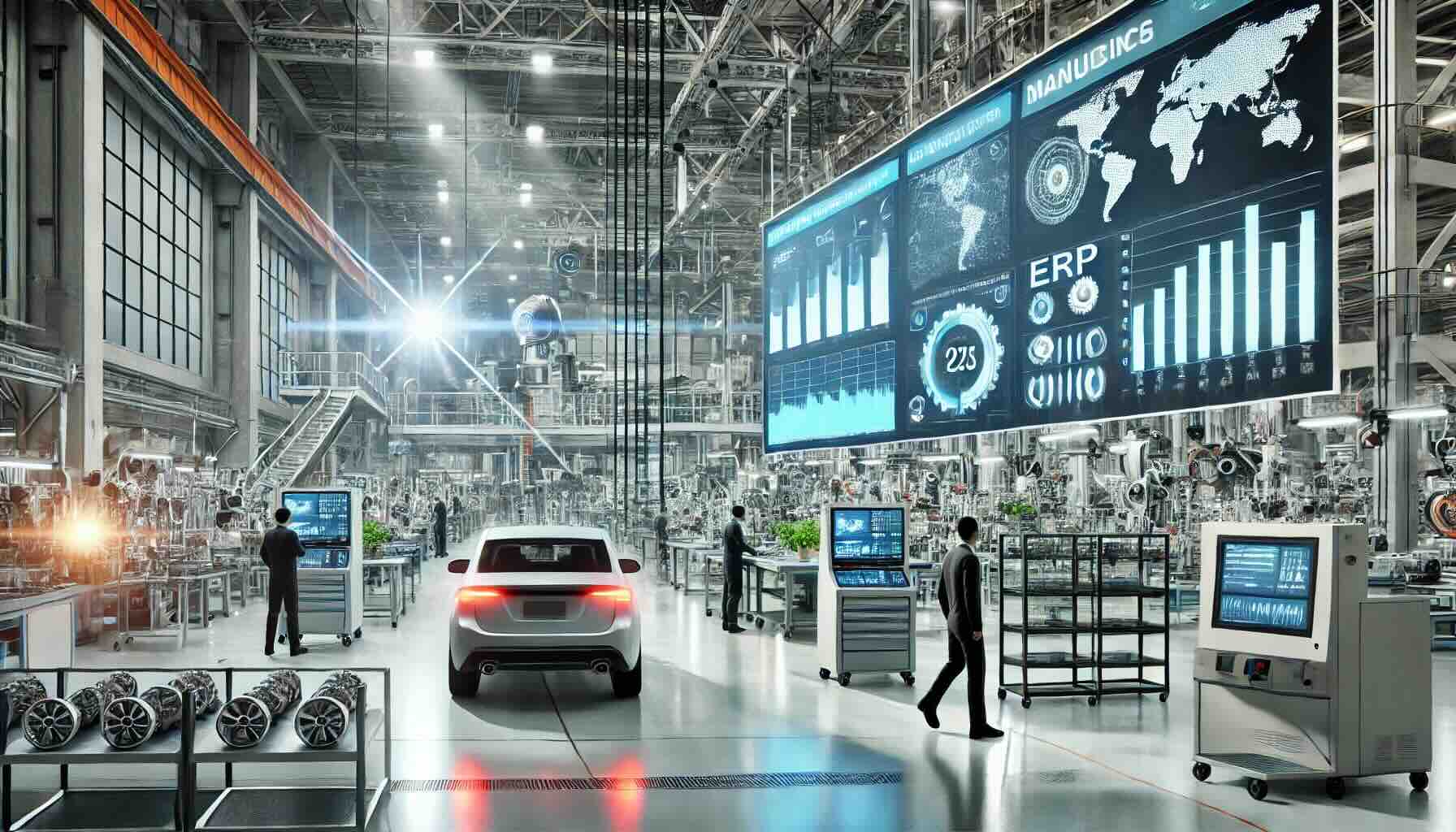Is DelmiaWorks ERP a Good Choice for Automotive Businesses?

In the fast-paced and highly regulated automotive industry, efficient manufacturing processes, accurate supply chain management, and compliance with strict quality standards are crucial to maintaining competitiveness. As automotive businesses look to streamline operations, improve productivity, and ensure compliance, many are turning to specialized ERP (Enterprise Resource Planning) systems to manage their complex needs. DelmiaWorks, formerly known as IQMS, is a prominent ERP solution specifically designed to meet the demands of manufacturers, particularly those in industries like automotive. This article evaluates DelmiaWorks for automotive businesses, examining its features, advantages, and potential drawbacks.
Understanding DelmiaWorks ERP
DelmiaWorks is a comprehensive ERP and MES (Manufacturing Execution System) platform developed by Dassault Systèmes, known for its robust solutions tailored to manufacturing industries. DelmiaWorks integrates key functionalities like production planning, quality management, inventory control, supply chain coordination, and financial management within a single platform, aiming to deliver seamless end-to-end automation and data visibility.
The platform’s modules are designed to support manufacturing-specific requirements, making it a viable option for automotive companies. DelmiaWorks is especially effective in handling the complex manufacturing and quality standards of the automotive sector, and its modular structure allows businesses to customize the platform to meet their unique needs.
Key Features of DelmiaWorks for Automotive
1. Real-Time Production Monitoring and Scheduling
In the automotive industry, efficiency and productivity are paramount. DelmiaWorks provides real-time monitoring tools that allow managers to track every stage of the production process, identify bottlenecks, and optimize schedules accordingly. This feature can be invaluable for automotive manufacturers needing to meet tight production timelines without sacrificing quality.
DelmiaWorks offers scheduling tools that adapt to shifts in demand, ensuring optimal machine usage and labor allocation. Automotive manufacturers can gain a complete view of the production floor, improving decision-making and maximizing productivity.
2. Quality Management and Compliance
Automotive manufacturers face stringent regulatory requirements, from ISO/TS 16949 to AIAG standards. DelmiaWorks includes built-in quality management features that help companies comply with these standards through statistical process control, traceability, and automated reporting.
With DelmiaWorks, businesses can create a centralized quality management system that spans supplier evaluations, in-process inspections, and final product audits. By maintaining a comprehensive view of quality data, DelmiaWorks helps reduce the risk of recalls and ensures that only high-quality products leave the factory.
3. Advanced Supply Chain Management
A robust supply chain is vital for automotive companies to operate smoothly, and DelmiaWorks includes features to help manage this complex aspect effectively. From supplier management to inventory control, DelmiaWorks enables end-to-end visibility of the supply chain, minimizing disruptions and ensuring timely deliveries.
Automotive manufacturers rely heavily on Just-in-Time (JIT) inventory to minimize storage costs. DelmiaWorks provides tools to optimize inventory management, helping manufacturers maintain ideal stock levels and reduce lead times, contributing to more agile operations and cost savings.
4. Comprehensive Financial Management
Integrating financial management into production and inventory processes is essential for profitability. DelmiaWorks offers integrated financial management tools that provide insight into cost accounting, budgeting, and financial forecasting. Automotive companies can benefit from the platform’s ability to calculate the total cost of ownership, analyze profitability, and manage cash flow in real-time.
This module allows managers to link financial outcomes directly to operational performance, facilitating data-driven decision-making and helping automotive businesses remain competitive in a high-stakes industry.
5. Automated Maintenance Management
Automated maintenance scheduling is particularly beneficial for automotive manufacturing, where equipment uptime is crucial. DelmiaWorks provides preventive maintenance tools that predict potential equipment issues before they result in costly downtime. This proactive approach to maintenance helps automotive companies avoid unexpected delays and maximize machine lifespan.
6. Data Analytics and Reporting
Data-driven decision-making is critical in today’s competitive automotive market. DelmiaWorks provides analytics tools that offer insights across all business areas, from production metrics to quality data and financial performance. Automotive companies can utilize this data for everything from optimizing processes to improving supplier relations and customer satisfaction.
With customizable dashboards and real-time reporting, DelmiaWorks empowers automotive companies with the insights needed to adapt to changing conditions quickly and efficiently.
Advantages of DelmiaWorks for Automotive
1. Industry-Specific Functionality
One of DelmiaWorks’ primary advantages for automotive companies is its industry-specific design. DelmiaWorks is tailored to meet the demands of manufacturing, particularly in the automotive sector. This focus means that it is equipped with the specific tools necessary for automotive production, quality, and compliance, without needing extensive customization.
2. Enhanced Compliance and Traceability
For automotive businesses, traceability is a must, particularly when managing recalls or ensuring quality standards. DelmiaWorks offers built-in traceability features that allow for seamless tracking of parts, materials, and finished goods throughout the supply chain. This feature makes it easier to trace and address issues, thereby ensuring compliance with regulatory requirements.
3. Seamless Integration Across Operations
The integration of ERP and MES capabilities within DelmiaWorks is another notable advantage for automotive companies. This seamless integration means that production data is directly connected to business data, enabling accurate, real-time insights and facilitating coordinated decision-making across departments. This holistic view of operations can reduce redundancies, increase efficiency, and foster a more agile organization.
4. Improved Supply Chain Resilience
Given the automotive industry’s heavy reliance on a global supply chain, DelmiaWorks’ supply chain management tools are highly valuable. They help manufacturers respond proactively to supply chain disruptions, which has become even more important in the wake of recent global events affecting supply availability and logistics.
Potential Drawbacks of DelmiaWorks for Automotive
1. Implementation Complexity
DelmiaWorks, with its robust capabilities, can be complex to implement, especially for businesses unfamiliar with ERP systems. Automotive companies may require specialized assistance during the onboarding phase, potentially increasing the initial costs.
2. High Initial Costs
As a comprehensive ERP solution, DelmiaWorks comes with a significant price tag, which may be challenging for smaller automotive manufacturers. While the system can yield significant cost savings over time, the initial investment can be substantial.
3. Training Requirements
Due to the platform’s complexity, employee training is essential to ensure that staff can use DelmiaWorks effectively. Automotive companies may need to invest additional time and resources in training programs, which could lead to temporary disruptions.
Is DelmiaWorks Right for Your Automotive Business?
DelmiaWorks ERP offers powerful, industry-specific features for automotive companies, from real-time production monitoring to comprehensive quality management and supply chain optimization. These features can help manufacturers streamline operations, maintain compliance, and respond proactively to changing market conditions. However, the system’s implementation complexity, cost, and training requirements may present challenges for some businesses.
For larger automotive manufacturers or those heavily invested in advanced manufacturing processes, DelmiaWorks can be a valuable asset that justifies the investment. Smaller automotive companies may find the system’s initial costs and learning curve prohibitive but may still benefit from DelmiaWorks if they prioritize scalability and long-term growth. To find out more about DelmiaWorks click this link.
To compare DelmiaWorks with 100s of other ERP solutions, you can use our new AI-powered Compare ERP tool. It’s free to use and you get a guaranteed discount on your first year’s licence fees with a referral from Compare ERP.









